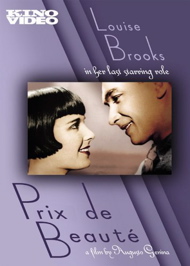| Release List | Reviews | Price Search | Shop | Newsletter | Forum | DVD Giveaways | Blu-Ray/ HD DVD | Advertise |
| Reviews & Columns |
|
Reviews DVD TV on DVD Blu-ray International DVDs Theatrical Reviews by Studio Video Games Features Collector Series DVDs Easter Egg Database Interviews DVD Talk TV DVD Talk Radio Feature Articles Columns Anime Talk DVD Savant HD Talk Horror DVDs Silent DVD
|
DVD Talk Forum |
|
|
| Resources |
|
DVD Price Search Customer Service #'s RCE Info Links |
|
Columns
|
 |
Prix de beauté
|
||||
The cult followers of the legendary actress Louise Brooks still ache for the starlet who flew the Paramount coop to seek higher fame in Europe. She made three pictures abroad, including G.W. Pabst's acknowledged masterpiece Pandora's Box. Millions of adoring words have been written about Brooks, the daring dancer with the Page Boy hairstyle. Her ambiguous smile still reaches from the screen to promise unspoken intimacies. She's the leading sex idol of classic film fans. Prix de beauté is Brooks' last European film, her only one made in France. She's in top form and specific scenes make an indelible impression. We're informed that the production was filmed both a silent and as a talkie, and that the longer silent version may be the better of the two. This talkie version is occasionally uneven but has a powerful climax. Louise Brooks is once again cast as an innocent girl who pays a steep penalty just for being an object of desire.
Louise Brooks' Pandora's Box is a German silent in dire need of the fine restoration given Fritz Lang's Metropolis. It's based on a cautionary tale about an all-destroying femme fatale, but Pabst dropped the moralizing and instead used Brooks' mysterious beauty to investigate the feminine mystique: Her Lulu is a petulant but innocent child-woman who causes woe for men only indirectly. Instead of condemning Lulu, Pabst portrays her violent fate as a gross injustice. There followed Diary of a Lost Girl and then Prix de beauté, which has been seen mostly as film clips in documentaries about Brooks and the French cinema. The script by Pabst and Rene Clair repeats the tale of beauty entrapped by possessive men, a pattern almost identical to the Dorothy Stratten tragedy told in Bob Fosse's Star 80. Sensitive director Agusto Genina refuses to find villains in Lucienne's story. She loves André but cannot help but be dissatisfied with his plan to turn her into a working class housewife. When the big prize puts her in the spotlight, Lucienne is thrilled by the attentions of her glamorous admirers, the overly dramatic Maharaja and the smooth talking Prince de Grabowski. André rushes after her with a wedding proposal that's also an ultimatum. Lucienne responds to her fiancée's appeal but is unsure whether it is love or a sense of obligation that brings her back to Paris as his wife. It doesn't last. After a few weeks of ironing and boredom Grabowski's offer of a film contract becomes an irresistible temptation. It's obvious that she was made for bigger things than André's possessive love. André's jealousy turns him into a menace. The film's final scene shows Lucienne to be fascinated by her image in screen tests, bigger than life and promising limitless fame and success. Prix de beauté's stunning conclusion forces us to compare Lucienne to her dream on the screen, making her yearning for glory into a macabre jest. Like Norma Desmond, Lucienne surrenders her soul and her life to an illusion. Prix de beauté has a lively opening in a water park and treats us to expressive, sometimes hand-held, scenes on the streets of Paris. The beauty pageant in San Sebastian is the weakest part of the film -- Brooks' unique qualities disappear when seen from 200 feet away under harsh sunlight. The celebration parties are a stylish whirl of lavish settings and beautiful clothing, all of which makes a strong contrast with the tatty sweater she wears as an unhappy housewife. We understand entirely when Lucienne bolts back to her dream life as a celebrity. The silent version of Prix de beauté may be better but this primitive talkie benefits from some great audio choices. The romantic tune sung by Lucienne at the beach is later reprised on the dance floor at San Sebastian. She plays it on a phonograph while she irons. Finally, Lucienne watches herself singing the song on-screen, a cinema voice that continues after the real Lucienne is gone. Louise Brooks' European movies encouraged her image as a butterfly destined to be destroyed by its own beauty, and the conclusion of Prix de beauté seems custom-built to create that legend. Kino's DVD of Prix de beauté is a handsome transfer that displays the fine work of cameraman Rudolf Maté. The final scene takes place in the flickering light of a film screening room and has a specific look I've not seen elsewhere. The craft of post-synchronizing dialogue was just getting started in France and the matches are very hit & miss. There is little control over presences. Exteriors are often nearly silent while interior rooms are filled with sound. The audio track has been carefully restored, with the film's musical selections sounding particularly fresh. Removable English subtitles are included. An image gallery presents some stills and an interesting selection of pressbook clippings. Several mention the anglicized title Miss Europe, but the film is known almost exclusively by its original French name.
On a scale of Excellent, Good, Fair, and Poor,
Prix de beauté rates:
Review Staff | About DVD Talk | Newsletter Subscribe | Join DVD Talk Forum |
|
| Release List | Reviews | Price Search | Shop | SUBSCRIBE | Forum | DVD Giveaways | Blu-Ray/ HD DVD | Advertise |






